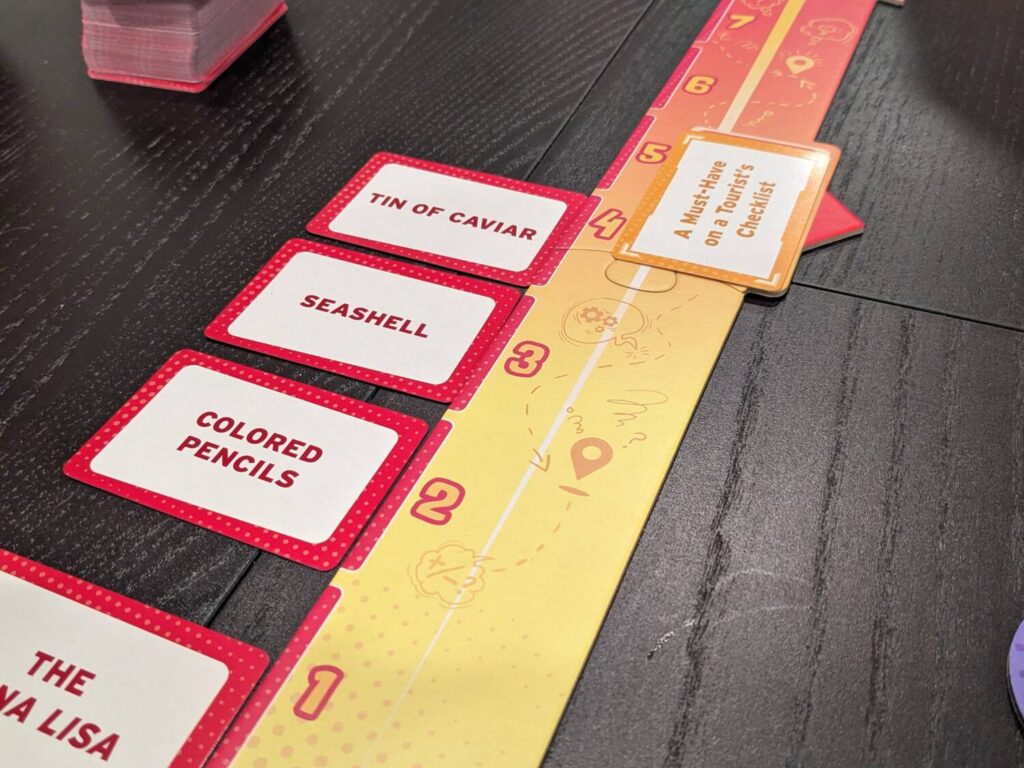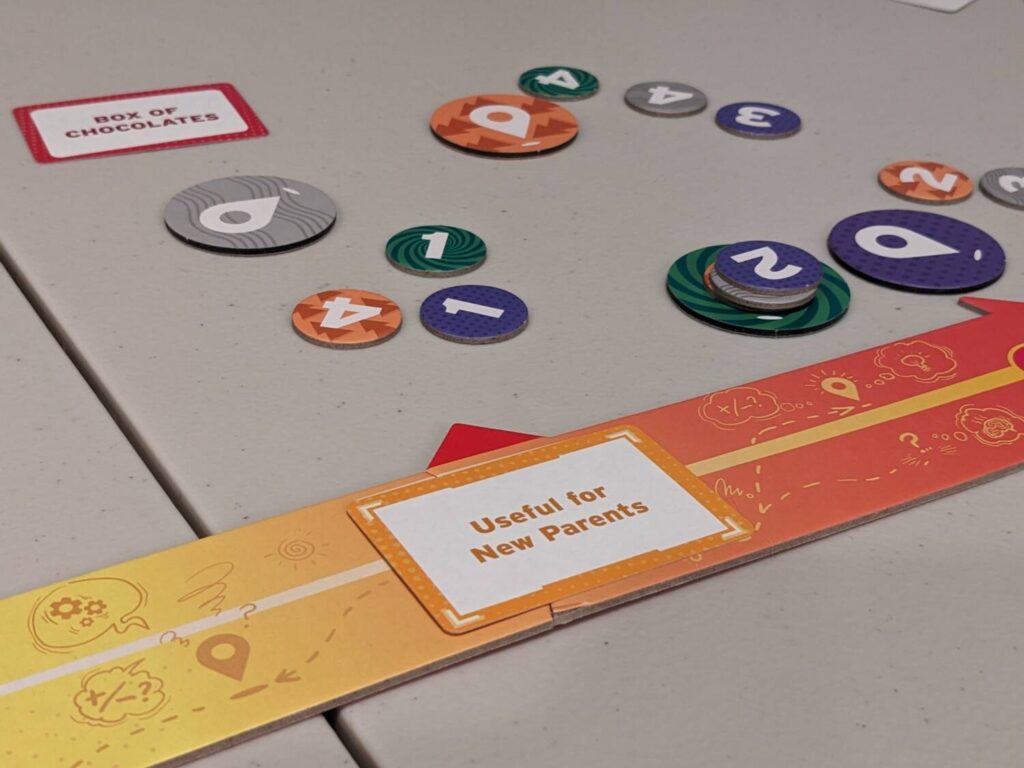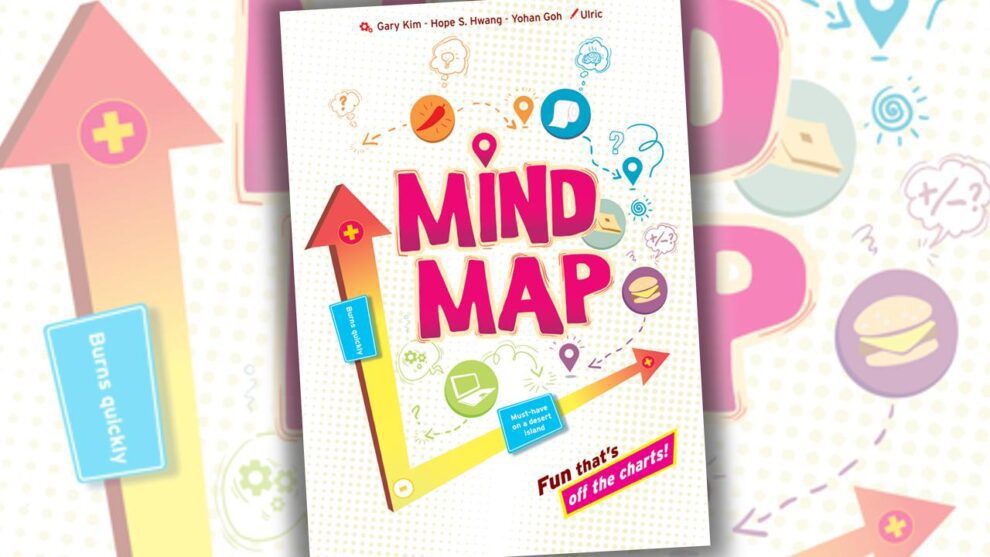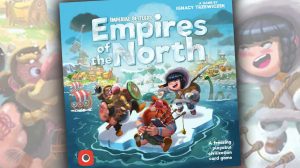Disclosure: Meeple Mountain received a free copy of this product in exchange for an honest, unbiased review. This review is not intended to be an endorsement.
On my second play of the new party game Mind Map (2024, Funnyfox and Sorry We Are French), two of the three players sitting at the table voted to stop.
We had just finished the second round…of a 15-minute game.
One player at the table, a game designer with multiple published credits to his name, really struggled because he knows how challenging it is to even get a game to the market. “This one’s tough, because I don’t want to be negative…but this just isn’t any fun. We can finish it if you want, but there’s a lot of flaws here.”
If you can believe this, the first group I showed this too, my Monday night review crew, thought Mind Map was even worse.
Mind Map is a word association game for 4-7 individual players, which can scale up to 8-14 players if using the team variant. I don’t get 8+ gamers together more than a couple times a year, so I did two four-player games of Mind Map for this review. Even if I wanted to do more plays, I couldn’t, because the two groups that tried it won’t try it again.

The problems with Mind Map begin with the rulebook. Mind Map is a party game, but it has a rulebook that runs eight pages long. If I can’t explain the game in 60 seconds, is it really a party game?
Now, the rulebook does do a good job of explaining examples you should use when teaching the game, because the premise isn’t simple. Over the course of three rounds, players are privately assigned a word, something like “diaper”, “colored pencils”, “yacht”, or “Swiss Army Knife”, from a pool of public words that are shared with all players along a standard X/Y graph. On each axis, there’s a card listing that round’s condition: “A Must-Have on a Tourist’s Checklist”, or maybe “Easily Hidden.”
Players use their personal GPS token in their color to plot their word on the graph. But there’s a twist—you also have to account for a “reference word” (the game’s parlance), which complicates the placement of your GPS marker.
Let’s say your word is “diaper”, but the reference word is “seashell.” If I have kids, “diaper” is a must-have on my tourist checklist because as any parent knows, you do NOT want to be hunting around for diapers when your two-year-old needs them most in a foreign land. But how easy is a diaper to hide? Is it harder to hide than a seashell?
Simultaneously, all players consider their secret assignment then plot their marker on the grid. Then players vote. Using the pool of words available in this round, which one is the red player’s word? How about the blue player? Is their placement more likely to be yacht or colored pencils?
When everyone reveals their words and votes, scoring is simple—one point for each correct vote you make, and one point for each vote correctly made on your word.

The reference word requirement leads to the game’s first strike: it’s a party game that likely works best with experienced gamers, or those comfortable with a medium-weight game. Mind Map is never going to work with my extended family members who already think “board games are silly” because there are a couple too many rules for something that should be light.
The second strike? Players have to sit below the graph looking at it straight on. Each player who joined me that sat across from or above the grid had trouble visualizing where they should plot their GPS marker. That means that with more players, more of you will need to sit in roughly the same table position. Is that going to work with seven players?
Strike three? The game is too short, and with only three rounds, I think the game is two rounds too short. That’s because your word assignment and the conditions in a round usually lead to at least one player having a very easy time plotting their word. In the game where I had “yacht”, the conditions were “The First Thing I Would Grab If My House Was on Fire” on one axis, and “Easily Hidden” on the other. The reference word was “tin of caviar.”
Everyone got my word. I’m never grabbing a yacht in a fire (although I do wish I had a yacht in real life, to even have this consideration) and we can all agree that a yacht is the furthest thing from “Easily Hidden.” More rounds ensure that when a player gets this lucky, other players can mitigate that with scoring an easier word of their own.
If I get more strikes, there’s a decent amount of nitpicking to do. The word choices here are a bit lacking. When two words create a tough choice of plotting, the two owners of those words have a pretty easy time guessing what the other close call would be since they can only vote on other players’ markers. The rules dictate that players should simultaneously place their GPS markers, but in my brief experiences, one or two players usually wait to see where everyone else plots before plotting their own token.

It’s Not Fun
As a design, I thought Mind Map was a near-total fail.
In fact, the most shocking fact about Mind Map is that it comes from a party game distributor and publishers that I trust. Hachette Boardgames USA, the partner who distributes games from publishers such as Sorry We Are French and Funnyfox, has released word association party games such as Zero to 100, Olé Guacamole, and one of the best party deduction games ever made, Decrypto.
How did Mind Map make the cut when they clearly know party games so well?
Now, as an experience, we did have some laughs during Mind Map, particularly when the game’s word choices produced a couple of those close calls. The game is very short, and I’m guessing the game shines best in a convention or large event environment where you can gather 10+ people—particularly experienced gamers who can pick up the rules—for the team variant.
But as a game for four or five players? The party game market, particularly the word association game market, is chock-full of great games…Just One, Wavelength, and Codenames (to name just a few) are so good and so well established that it’s hard to ever imagine playing Mind Map over one of those classics.











